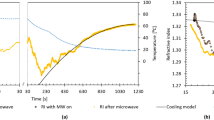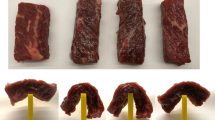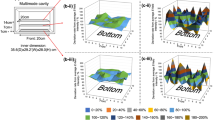Abstract
DURING an investigation of the effects of microwave energy on organic reactions, a novel application of such radiation has been disclosed. One well-known difficulty in the examination of solid-state pyrolytic reactions is that, perforce, for each particle, the products move from the site of their production against a positive temperature gradient. For any sizable particle, therefore, the pyrolysate is subject to further decomposition and, in many cases, it is impossible to isolate the primary products.
This is a preview of subscription content, access via your institution
Access options
Subscribe to this journal
Receive 51 print issues and online access
$199.00 per year
only $3.90 per issue
Buy this article
- Purchase on Springer Link
- Instant access to full article PDF
Prices may be subject to local taxes which are calculated during checkout
Similar content being viewed by others
References
McTaggart, F. K., Austral. J. Chem., 18, 937 (1965)
Author information
Authors and Affiliations
Rights and permissions
About this article
Cite this article
CANE, R. Microwave Stimulation of Chemical Reactions. Nature 209, 197–198 (1966). https://doi.org/10.1038/209197b0
Issue Date:
DOI: https://doi.org/10.1038/209197b0
Comments
By submitting a comment you agree to abide by our Terms and Community Guidelines. If you find something abusive or that does not comply with our terms or guidelines please flag it as inappropriate.



